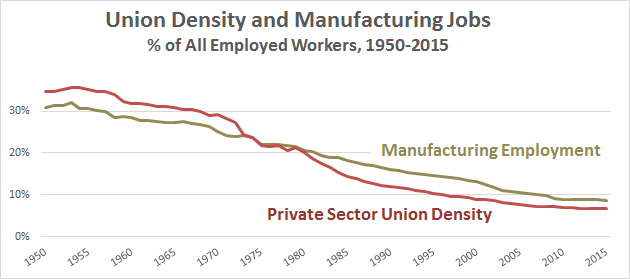Over at Vox, Sean Illing interviews Justin Gest, a professor of public policy at George Mason University. Gest says that the white working class doesn’t fit neatly into either party: Republicans don’t like their protectionism and Democrats don’t like their nativism. This feeds their sense of marginalization:
White working-class people were left, not necessarily dismissed, but they’ve received a lot of lip service from both political parties over the years who were never truly prepared to go all in on the things they most cared about. But perhaps even more importantly, neither party did much to symbolically represent white working-class people in terms of the candidates they selected and the language they used.
….Politics is all about perceptions, and perceptions are so much more important than reality in terms of predicting voting behavior….If we’re trying to understand the political behavior of white working-class people, their sense of marginality and beleaguerment is real, and in their minds it’s meaningful — and that’s what matters in terms of our efforts to make sense of it.
In other words, you can tell them all day long that other people have it even worse, but that doesn’t make things any better. In the entire history of the world, it’s unlikely that this approach has ever made anyone feel any better.
But this raises a question that’s poked at me for years. Let’s just agree that the way we talk is important. Liberals certainly agree that it’s important when it comes to marginalized groups like women, blacks, Muslims, and so forth. They want dignity and respect, and you can’t use language that demeans them if you’re trying to win their votes.
Fine. But at some point you also need some substance. Eric Holder fought back against the gutting of the Voting Rights Act. Democrats passed—and Obama signed—the Lilly Ledbetter Act. Hillary Clinton supported an increase in the number of Syrian refugees we accepted even though it was politically dangerous.

So if liberals want to appeal to the white working class, they need some substantive policies to go along with a change in attitude. But what would those be? This is where I keep coming up short.
- Stop negotiating trade deals? OK, but we all know that this won’t really accomplish much—and has plenty of downsides.
- Bring back the manufacturing jobs? There’s almost unanimous agreement that there’s no way to do this.
- Increase unemployment benefits and other forms of social welfare? That’s not what they want. They want good jobs.
- Childcare and maternity leave benefits? See above. Besides, Democrats already support this. Republicans are the roadblock.
- Offer retraining and relocation benefits? I recommend you keep your distance when you suggest this. Most struggling working class folks (a) don’t want this and (b) have heard it a million times and don’t believe it.
- Move lots of government agencies out of Washington DC and into the heartland? Maybe, but the overall impact would be small and would mostly provide middle-class service jobs anyway.
- Bring unions back? That would be great, but Republicans will never let it happen.
- Get tough on immigration? Rhetorically this worked pretty well for Trump, but the truth is that the white working class in the upper Midwest hasn’t actually lost many jobs to Mexican immigrants—maybe none at all. In the end, I doubt that Trump will reduce illegal immigration much, and even if he does it won’t have more than a minuscule impact on the white working class in Wisconsin.
- Tax cuts? There aren’t a lot of taxes to cut for families at working-class income levels. Besides, from a purely political standpoint, Democrats will never out-tax-cut Republicans.
Maybe there’s some genuinely great idea that I haven’t heard of. If so, I’m all ears. Beyond that, the only real possibilities seem to be some mix of moving rightward on social issues and paying less attention to the concerns of people of color. Those are nonstarters, I hope.
So what’s the answer? These guys want us to bring back the 50s, and that’s not possible. Are we supposed to adopt a campaign of pure gasbaggery, like Trump, with no actual substance to go along with it? Or are there truly some simple, concrete, and highly effective policies we could adopt to help out the white working class?














